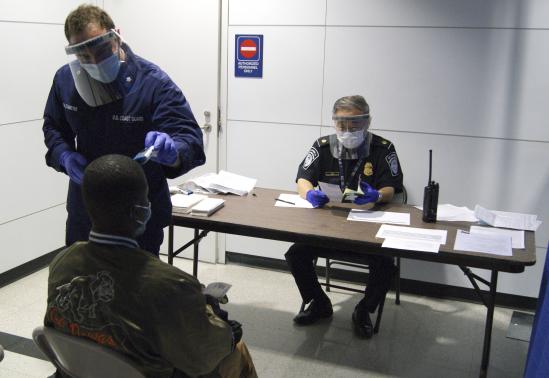
CREDIT: REUTERS/U.S. CUSTOMS BORDER PROTECTION/MELISSA MARAJ
(Reuters) – The United States ratcheted up its safeguards against Ebola on Tuesday, requiring travelers from three countries at the center of an epidemic in West Africa to fly into one of five major airports conducting enhanced screening for the virus.
The restrictions on passengers whose trips originated in Liberia, Sierra Leone or Guinea were announced by the U.S. Department of Homeland Security and were set to go into effect on Wednesday. The precautions stop well short of the travel ban sought by some U.S. lawmakers to prevent further Ebola cases in the United States.
Affected travelers will have their temperatures checked for signs of a fever that may indicate Ebola infection, among other protocols, at New York’s John F. Kennedy, New Jersey’s Newark, Washington Dulles, Atlanta, and Chicago’s O’Hare international airports, officials said.
“We are working closely with the airlines to implement these restrictions with minimal travel disruption,” Homeland Security Secretary Jeh Johnson said in a statement. “If not already handled by the airlines, the few impacted travelers should contact the airlines for rebooking, as needed.”
Johnson said those airports account for about 94 percent of travelers flying to the United States from the three countries, noting that there are no direct, nonstop commercial flights from Liberia, Sierra Leone or Guinea to the United States.
“We currently have in place measures to identify and screen anyone at all land, sea and air ports of entry into the United States who we have reason to believe has been present in Liberia, Sierra Leone or Guinea in the preceding 21 days,” Johnson said.
Washington-based trade group Airlines for America, or A4A, noted that under 150 people per day travel to the United States from those three countries and about 6 percent of them, some nine people daily, have been arriving at airports other than the five airports with enhanced Ebola screening.
The group’s member airlines are “cooperating fully” with the U.S. Customs and Border Protection agency to reroute that 6 percent of travelers to the five designated airports, A4A spokeswoman Jean Medina said.
The group’s members include Delta Air Lines (DAL.N), United Airlines (UAL.N) and American Airlines (AAL.O), none of which fly to the affected countries. However, they may carry passengers from these countries on a connecting flight.
The worst Ebola outbreak on record has killed more than 4,500 people, mostly in Liberia, Sierra Leone and Guinea. Only three Ebola cases have been diagnosed in the United States: Liberian Thomas Eric Duncan, who died on October 8 at Texas Health Presbyterian Hospital in Dallas, and two nurses who treated him.
On Tuesday, the U.S. National Institutes of Health outside Washington, D.C., upgraded the medical condition of one of the nurses, Nina Pham, to good from fair. She entered a special NIH facility in Bethesda, Maryland, for treatment last Thursday.
The other nurse, Amber Vinson, is being treated at Emory University Hospital in Atlanta. Vinson’s mother, Debra Berry, told ABC’s “Good Morning America” program her daughter is weak but recovering.
NBC freelance cameraman Ashoka Mukpo, who contracted Ebola while working in West Africa, is free of the virus and will leave the Nebraska Medical Center on Wednesday, the hospital said. Mukpo arrived in the United States on October 6 for treatment. He is the second patient to be successfully treated for Ebola at the Nebraska Medical Center, the hospital said on Tuesday.
SUPPORT FOR TRAVEL BAN
A Reuters/Ipsos online poll released on Tuesday showed that nearly three-fourths of 1,602 Americans surveyed favored a U.S. ban on civilian air travel in and out of Liberia, Sierra Leone and Guinea.
In Washington, some lawmakers welcomed the government’s new steps while others said more needed to be done.
Democratic U.S. Senator Charles Schumer of New York called the Department of Homeland Security move “a good and effective step towards tightening the net and further protecting our citizens.”
Republican Representative Bob Goodlatte of Virginia, who heads the House of Representatives Judiciary Committee, said Obama needs to impose a travel ban.
“President Obama has a real solution at his disposal under current law and can use it at any time to temporarily ban foreign nationals from entering the United States from Ebola-ravaged countries,” Goodlatte said.
White House spokesman Josh Earnest told reporters Obama is “not philosophically opposed to a travel ban” and remains “open to it” if the scientists and public health experts advising him say it would help protect Americans. Earnest said those advising the president currently oppose such a ban.
Airlines for America official Vaughn Jennings said the group opposes a travel ban. “We agree with the White House that discussions of flight bans are not necessary and actually impede efforts to stop the disease in its tracks in West Africa,” Jennings said.
On Tuesday, the Dominican Republic became the latest country to impose a travel ban on foreigners who have visited Ebola-affected countries in the previous 30 days.
Concerns that Americans might fall victim to scams because of fear about Ebola prompted a warning from New York state Attorney General Eric Schneiderman about bogus Ebola preparedness kits and preventative medications.
There are no U.S. government-approved vaccines, medications or dietary supplements to prevent or treat Ebola.
In Texas, 60 people have been removed from watch lists after showing no Ebola symptoms in 21 days of monitoring, with 112 more people still being monitored for possible exposure, federal health officials said.







